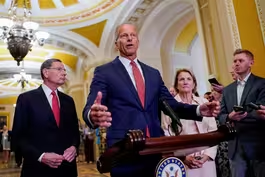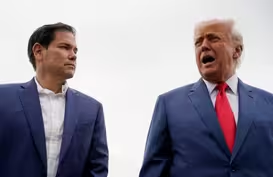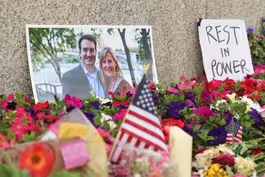
How AI startups hope to help feed India
Clip: 6/17/2025 | 8m 4sVideo has Closed Captions
Can AI help solve India’s food and water insecurity?
One of the largest challenges facing India: how to sustain food production for 1.4 billion people amid deteriorating soil quality, diminishing water supplies and climate change. For some, including hundreds of artificial intelligence startup companies, the challenge represents a business opportunity. From India, Fred de Sam Lazaro reports.
Problems playing video? | Closed Captioning Feedback
Problems playing video? | Closed Captioning Feedback
Major corporate funding for the PBS News Hour is provided by BDO, BNSF, Consumer Cellular, American Cruise Lines, and Raymond James. Funding for the PBS NewsHour Weekend is provided by...

How AI startups hope to help feed India
Clip: 6/17/2025 | 8m 4sVideo has Closed Captions
One of the largest challenges facing India: how to sustain food production for 1.4 billion people amid deteriorating soil quality, diminishing water supplies and climate change. For some, including hundreds of artificial intelligence startup companies, the challenge represents a business opportunity. From India, Fred de Sam Lazaro reports.
Problems playing video? | Closed Captioning Feedback
How to Watch PBS News Hour
PBS News Hour is available to stream on pbs.org and the free PBS App, available on iPhone, Apple TV, Android TV, Android smartphones, Amazon Fire TV, Amazon Fire Tablet, Roku, Samsung Smart TV, and Vizio.
Providing Support for PBS.org
Learn Moreabout PBS online sponsorshipAMNA NAWAZ: One of the largest challenges facing the world's most populous nation is food security, how to sustain food production for 1.4 billion people in India amid deteriorating soil conditions, diminishing water supplies and climate change.
For some, including hundreds of artificial intelligence start-ups, the challenge represents a business opportunity.
From India, Fred de Sam Lazaro reports.
FRED DE SAM LAZARO: From all appearances, this vineyard looks very healthy, but its owner must stay constantly on guard for pests or disease that can wipe out a crop, another challenge, persistent water shortages.
NARAYANAPPA MURTHY, Farmer: Water, full scarcity.
FRED DE SAM LAZARO: Water is very scarce.
NARAYANAPPA MURTHY: Especially water management is very difficult.
FRED DE SAM LAZARO: Just over a year ago, Narayanappa Murthy signed on to a service that, for between $30 and $70 a year, offers a bounty of useful data.
A sensor constantly monitors soil and leaves for moisture, which, along with weather data, is analyzed with artificial intelligence to provide guidance precisely tailored to this farm.
It's led to big savings.
NARAYANAPPA MURTHY: Fifty to 60 percent cutback.
FRED DE SAM LAZARO: So you have saved 60 percent?
NARAYANAPPA MURTHY: Sixty percent.
FRED DE SAM LAZARO: In your water bill?
NARAYANAPPA MURTHY: Water bill and power bill.
FRED DE SAM LAZARO: Murthy has branched out to grow pomegranates and added a newer model of the sensor made by an agriculture tech start-up called Fyllo.
MAN: Irrigation, all the way, it will be the same.
FRED DE SAM LAZARO: Fyllo has seen robust growth since its founding five years ago.
SHRIYOG NORLAWAR, Institutional Sales Lead, Fyllo: We are working with almost 10,000-plus farmers.
FRED DE SAM LAZARO: Shriyog Norlawar, Fyllo's sales chief, says, in many cases, the company's product has made the difference in keeping farmers in business.
SHRIYOG NORLAWAR: The usage of water is four to five times excessive than it should be.
We have saved around 90 billion liters of water.
FRED DE SAM LAZARO: The smartphone app tied to their devices is accessible in multiple languages, he says.
SHRIYOG NORLAWAR: We have developed modules for all kinds of crop for its irrigation management and for its nutrition management also in addition.
FRED DE SAM LAZARO: A.I.
has enabled the ability to interpret massive amounts of raw data collected in the field or via satellites.
KRISHNA KUMAR, Co-Founder, Cropin: Today, we have like 0.5 billion records of farm data from 103 countries on 500 crops and 10,000 varieties of those crops.
FRED DE SAM LAZARO: In 2010, Krishna Kumar founded Cropin, another among scores of agriculture tech start-ups.
KRISHNA KUMAR: Now this model predicts the future.
FRED DE SAM LAZARO: Most of his clients are large multinationals like Walmart and Pepsico, who are provided real-time intelligence about supplier farms across their far-flung supply chains.
KRISHNA KUMAR: What is the risk approaching?
What disease can hit your farm in like seven to 15 days?
What yield you can expect?
We layer thousands of variables on every unit of the farm, and then we scale that to a country in the supply chain.
So you can factor the data for various use cases, whether it's a sourcing decision, policymaking decision, you want to go to a newer country to grow a newer variety, how that variety will perform in that country.
FRED DE SAM LAZARO: Based in India's tech capital, Bangalore, Cropin, Fyllo and others have generated lots of interest in financial markets.
The question is, are they really improving this country's food security?
For the majority of India's farmers, who own only small plots of land, artificial intelligence might hold some promise, but their problems go well beyond the scope of A.I.
It's no use knowing when to irrigate, for example, when you don't irrigate your farm and depend on rainfall.
It's no use knowing what market prices are when your produce can't get to the market on time.
AMIT PRAKASH, International Institute of Information Technology, Bangalore: Almost 80 to 90 percent of our farmers are smallholders.
FRED DE SAM LAZARO: Amit Prakash teaches technology and ethics at the Indian Institute of Information Technology in Bangalore.
AMIT PRAKASH: When we start looking at them as problems who need a solution that comes to them from either Bangalore or California or anywhere else or New Delhi, then I think we have started with a bias.
FRED DE SAM LAZARO: And that bias against small rural farmers has been the pattern for some decades when it comes to bringing technology to agriculture, he says.
Data cannot capture the whole picture, for example, sending a farmer advisories that they can get a better price for their produce in market two instead of market one.
AMIT PRAKASH: They would still take it to market one because they have been transacting with a person, a commission agent in market one, since their grandfathers' time.
Those kinds of relationships matter quite a lot.
FRED DE SAM LAZARO: Smallholder farmers, many living in poverty with little formal education, can ill afford risk, he says, and so they rely heavily on such relationships, the familiar.
That applies to getting advice as well.
AMIT PRAKASH: Knowledge absorption is better if I hear it from someone who I have seen or who I am able to relate to better.
FRED DE SAM LAZARO: And trust, basically.
AMIT PRAKASH: Trust, yes, and proximity.
The person who is talking about whatever they have done on their farm is also a farmer like me.
WOMAN: We saw how farmers learn from one another through informal social networks.
FRED DE SAM LAZARO: That peer-to-peer approach is used by a group called Digital Green.
NIDHI BHASIN, CEO, Digital Green Trust: We are very clear.
We are addressing the smallholder farmer.
FRED DE SAM LAZARO: Nidhi Bhasin leads the nonprofit group started in 2008 and now serving farmers in India and parts of Africa.
It began with YouTube videos, with farmers sharing insights with each other, but has now evolved to a chatbot called Farmer.chat... WOMAN: We have built a multilingual A.I.
chatbot system.
FRED DE SAM LAZARO: ... offering vetted expertise, weather and market information in the farmers' native languages.
NIDHI BHASIN: Localize cost-effective information advisory, which will help them to increase their incomes.
We're also sending them certain information which is very contextual.
It's something... FRED DE SAM LAZARO: It's less foreign to the farmers.
NIDHI BHASIN: Yes, it's less foreign.
FRED DE SAM LAZARO: Chandrakala and husband Keshava Murthy have used it to help plan a climate-smart, sustainable farm with livestock, timber, fruits and vegetables.
KESHAVA MURTHY, Farmer (through translator): People think agriculture means losses, and I want to prove that it's sustainable with short-, middle- and long-term strategies.
FRED DE SAM LAZARO: They showed me how Farmer.chat guided them to find a natural cure, neem oil, for a disease threatening their lemon trees.
CHANDRAKALA MURTHY, Farmer (through translator): I can use the phone to ask any number of questions.
FRED DE SAM LAZARO: Digital Green has tried in particular to reach women farmers and to work in more impoverished regions like India's Bihar state.
In all, it serves 160,000 farmers in India and East Africa, meeting a tiny fraction of the need, Nidhi says.
The group is trying to look to partner with private for-profit players.
NIDHI BHASIN: We also want a good balance between the two approaches.
FRED DE SAM LAZARO: Do you need to make those partnerships in order to scale further, you think?
NIDHI BHASIN: Yes, from a scale point of view.
FRED DE SAM LAZARO: Professor Prakash agrees all A.I.
players should have a role in sustaining small farmers, and it will take government too, he says, to update farm policies and infrastructure.
Most of all, it will take farmers, he says.
AMIT PRAKASH: We have to bring in the small farmers.
We have to hear what they have to say, not from the perspective of providing them with a solution, but designing a solution along with them.
FRED DE SAM LAZARO: Along with them, at 150 million smallholder farmers, most of them marginal and struggling, but still a critical pillar of India's economy.
For the "PBS NewsHour," this is Fred de Sam Lazaro in Bangalore.
AMNA NAWAZ: And Fred's reporting is a partnership with the Under-Told Stories Project at the University of St. Thomas in Minnesota.
Can Trump’s ‘big, beautiful bill’ pass the Senate?
Video has Closed Captions
Clip: 6/17/2025 | 5m 20s | Can Trump’s ‘big, beautiful bill’ make it through the Senate? (5m 20s)
Former Fulbright board member on Trump’s interference
Video has Closed Captions
Clip: 6/17/2025 | 6m 18s | Why Fulbright board members resigned in mass last week (6m 18s)
How immigration crackdowns are affecting Latino communities
Video has Closed Captions
Clip: 6/17/2025 | 10m 16s | Pastors share how immigration crackdowns are affecting their communities (10m 16s)
Israel’s war against Iran poses challenges for Trump team
Video has Closed Captions
Clip: 6/17/2025 | 11m 50s | Trump faces difficult choices in support for Israel’s war on Iran (11m 50s)
News Wrap: Appeals court hears Trump National Guard case
Video has Closed Captions
Clip: 6/17/2025 | 4m 30s | News Wrap: Court considers Trump’s California National Guard deployment (4m 30s)
Understanding political violence, and how to fix it
Video has Closed Captions
Clip: 6/17/2025 | 6m 5s | Understanding the root causes and possible solutions for rising political violence (6m 5s)
Providing Support for PBS.org
Learn Moreabout PBS online sponsorshipSupport for PBS provided by:
Major corporate funding for the PBS News Hour is provided by BDO, BNSF, Consumer Cellular, American Cruise Lines, and Raymond James. Funding for the PBS NewsHour Weekend is provided by...

















